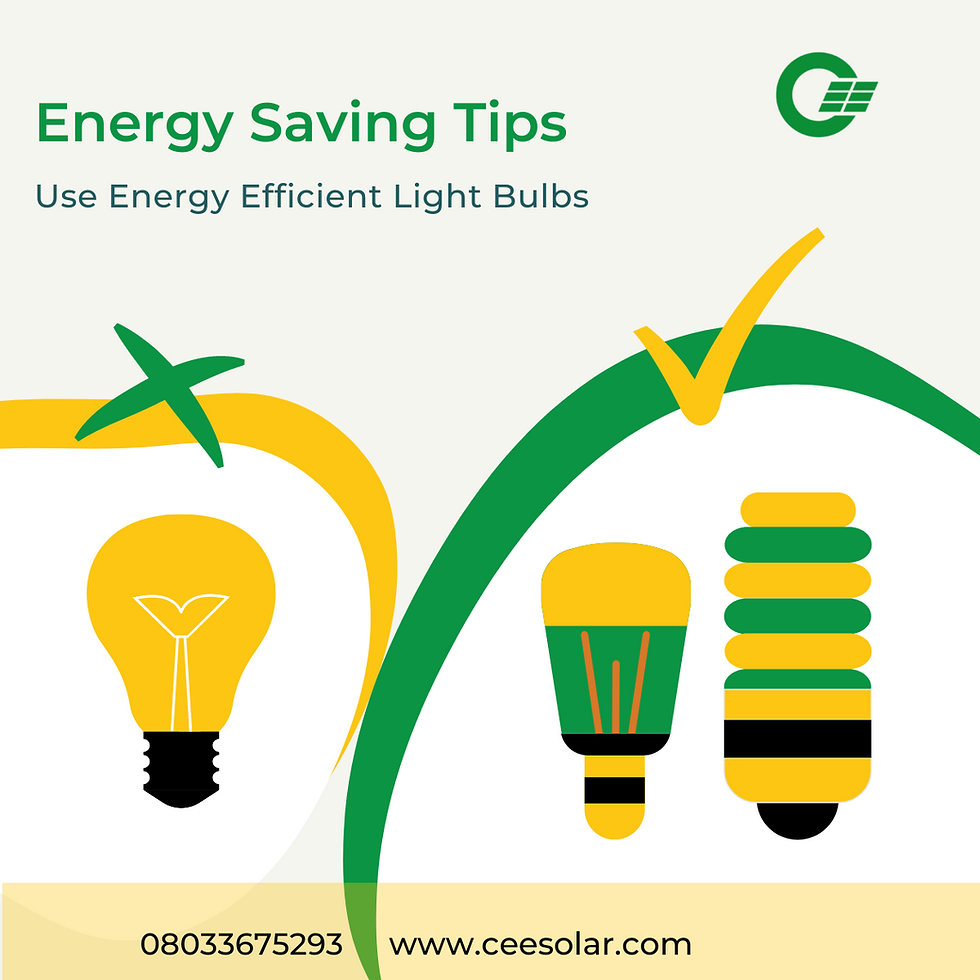All You Need to Know About Turning Off Your Lights to Save Energy
- loyaltymejabi5
- Feb 17, 2023
- 3 min read

As a homeowner, the whole concept and idea of energy conservation, efficiency, and savings are doubtlessly not new to you. And rightly so. If you are someone who is particular about your expenses and tries as much as possible to reduce your energy cost, this is something you should take as very important.
A lot has been written on essential energy-saving tips, and ranking high among these tips is the need to always turn off your lights when not in use to save energy. This is very important because research has shown that lighting accounts for about 12-15% of a typical residential utility bill. That means if you are looking at reducing costs and increasing savings on energy, you need to pay particular attention to your lighting system.
Here are some things you need to know about turning off light bulbs in your home:
It Saves Energy
You would hardly know how much energy you can save in your home until you check the power rating on your lightbulbs and see how many kilowatt-hours you can save if you turn them off more frequently. As an example, suppose you have 1 bulb that is rated 30 watts. If you turn it off for 1 hour, you would have saved 0.03kWh. Turn it off for 2 hours and that becomes 0.06kWh. Of course, these energy savings can easily be used for other energy needs.
It Saves You Money
It goes without saying that as you save energy in your home, you are as well reducing costs and saving money. All you have to do is know how much you pay per kilowatt-hour for electricity in your home. Armed with this figure, you can see how much money you save when you multiply this by how much energy in kWh hour you are saving when you turn off your lightbulbs. Who knows? You might just be saving more than enough for that next vacation or new clothes.
It Can Be Automated
We understand how difficult it can be sometimes to remember to put off the lightbulbs when leaving a room or stepping out of the house in the morning. We've been there as well several times. However, the good news is that this 'ritual' can be automated. You can install lighting controls in your homes such as motion detectors or timers. These can automatically help you control your lights and make them more efficient. That way, you do not need to worry about forgetting to do the right thing.
This is More Important for Incandescent and Fluorescent Bulbs
It is important to note that there are different kinds of lightbulbs, all with different energy efficiency. The most culpable lightbulbs when it comes to inefficiency and energy consumption are incandescent and fluorescent bulbs. If you currently use these kinds of bulbs, it is necessary to put them off even if you are stepping out of your room or home for a few minutes. Their energy consumption is on the high and they are typically inefficient. If you can, it is best to replace them with more energy-efficient bulbs such as LED bulbs.

You Be A Hero - Saving Planet Earth
With all the talk about climate change, protecting our environment, and saving the planet earth, you just can't tell how much of an impact you would make by remembering to turn off those lightbulbs when not in use. When you do this, you reduce carbon emissions and footprint and be the hero, helping to save the planet.
Final Thoughts
Perhaps you've recently noticed your utility bills are on the high side and adversely affecting your savings. It is good to know that you can cut your expenses when it comes to power and save more. This is possible by turning off your lightbulbs when not in use. That way, you save energy and in turn save money. Of course, there are also many other essential energy-saving tips. But this is a good place to start.
Contact energy savings professionals at Ceesolar Energy Ltd on 07047588581 or email team@ceesolar.com, to learn of other energy savings tips, or install energy savings timers in your home or offices.

Ceesolar Engineer Installing Timers for ACs in a Restaurant, to Save Energy and Costs
So, before you step out of the house, have you turned off the lightbulbs?

Часом знаходжу цікаві сайти — випадково або коли хтось ділиться в чаті. Частину зберігаю про запас, іноді повертаюсь до них при нагоді. Тут є різне — новини, блоги, локальні стрічки чи просто незвичні штуки. Деякі переглядаю рідко, деякі — коли хочеться вийти за межі звичних джерел. Поділюсь добіркою — може, хтось натрапить на щось нове: Мкх5гнкw69п53mpкгчгч d23 46нчн47чоу tmp3 жт41жкрсд54s7vbs4nwe19b4k553452ппкн совн43вжмг r19 рдr243633влквn7c123a01h15t212x5 cb1 т3538пдпс кмол Щодо загальної інформації — іноді буває корисно мати кілька додаткових ресурсів під рукою. Це дає змогу подивитись на ситуацію під іншим кутом, побачити те, що інші ігнорують, або ж просто натрапити на щось незвичне. Зрештою, інформація — це простір для орієнтації, і що ширше коло джерел, то більше шансів не опинитись у бульбашці влас…
Мкх5гнк w69 п53mpкгчгч d23 46нчн47чоу tmp3 жт41жкрсд54s7vbs4nwe19b4 k553452ппкн совн43вжмг r19 рдr243633влквn7c123a01h15t212x5 cb1 т3538пдпс кмол Часом знаходжу ці джерела випадково, іноді хтось скине в чат, іноді сам зберігаю “на потім”. Частину переглядаю рідко, частину — коли шукаю щось локальне чи нестандартне. Вони різні: новини, огляди, думки, регіональні стрічки. Я не беру все за правду — скоріше, для порівняння та пошуку контрасту між подачею. Можливо, хтось іще знайде серед них щось цікаве або принаймні нове. Головне — мати з чого обирати.